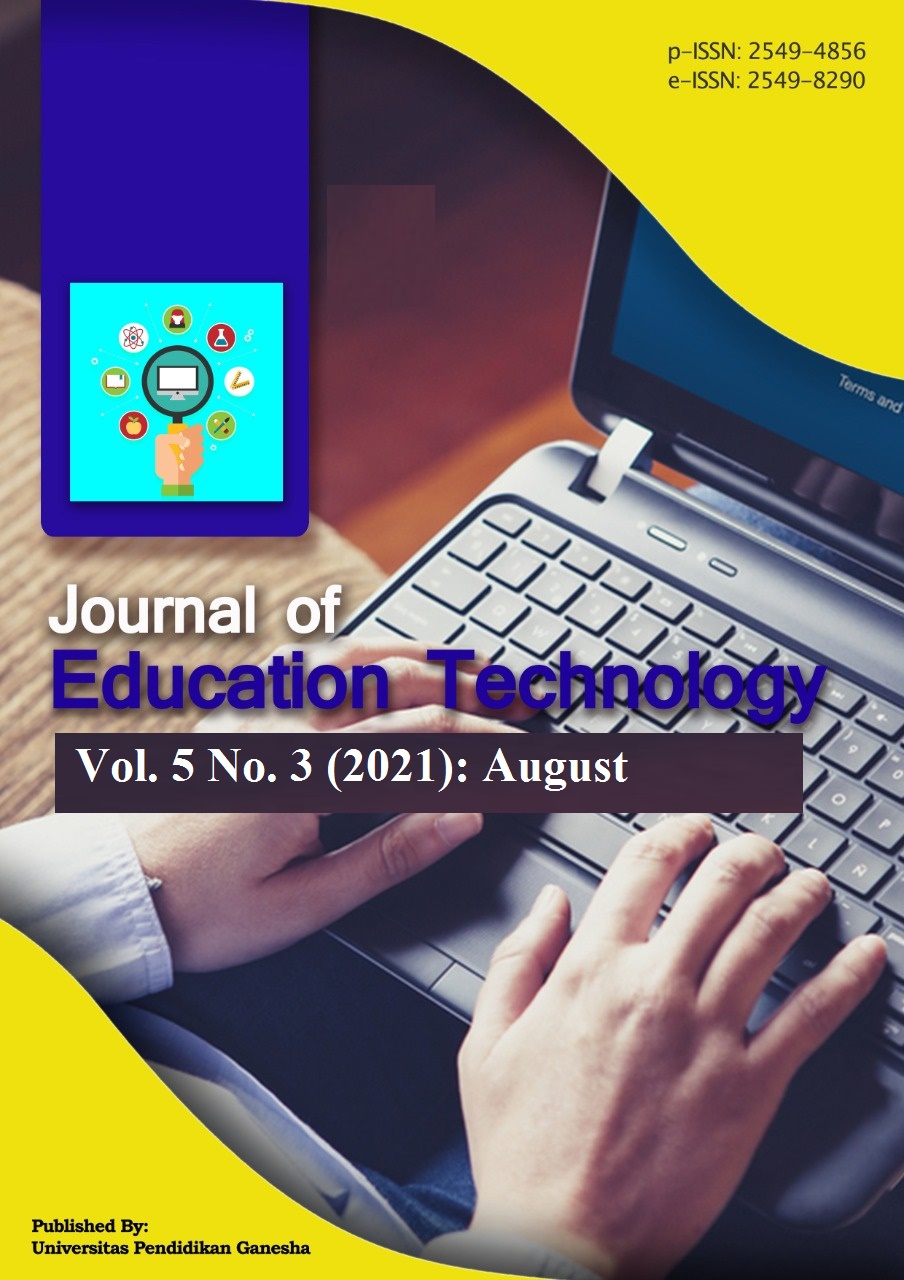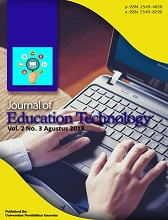The Relationship Between the Application of E-Modules Based on Mangrove Forest Ecotourism on the Peace-Loving Character of Students
DOI:
https://doi.org/10.23887/jet.v5i3.34043Keywords:
peace love, local wisdom, e-moduleAbstract
Teachers still find it difficult to use technology to develop open materials for students, so that it has an impact on low student learning outcomes. The purpose of this study was to analyze the peace-loving character of students after an electronic module based on local wisdom ecotourism of The Basal Babu Mangrove Forest was applied. This type of research is quantitative with research methods using quantitative associative research. The sample in this study was 32 fourth-grade elementary school students. The sampling technique was total sampling. The techniques used to collect data are observation, interviews, and questionnaires. The data collection instrument used was a questionnaire. The data analysis technique used descriptive statistics and inferential statistics. The result in this study is that the cinta damai character owned by the students has a good category, seen from the peace-loving character after the electronic module based on local wisdom, using the correlation results obtained 0.937 and the results of a positive relationship. This shows that there is a relationship between the peace-loving character and the application of the electronics module. This research implies that the application of this electronic module helps students learn independently and can improve students' character.
References
Ali, S., Hafeez, Y., Humayun, M., Jamail, N. S. M., & Aqib, M. (2021). Enabling Recommendation System Architecture in Virtualized Environment for E-Learning. Egyptian Informatics Journal. https://doi.org/10.1016/j.eij.2021.05.003.
Alias, N., & Siraj, S. (2012). Effectiveness of Isman Instructional Design Model in Developing Physics Module Based on Learning Style and Appropriate Technology. Procedia - Social and Behavioral Sciences, 64. https://doi.org/10.1016/j.sbspro.2012.11.002.
Almusawi, H. A., Durugbo, C. M., & Bugawa, A. M. (2021). Innovation in Physical Education: Teachers’ Perspectives on Readiness for Wearable Technology Integration. Computers & Education, 167. https://doi.org/10.1016/j.compedu.2021.104185.
Aprilia, I., & Suryadarma, I. G. P. (2020). E-Module of Mangrove Ecosystem (EMME): Development, Validation, and Effectiveness in Improving Students’ Self-Regulated. Biosfer : Jurnal Pendidikan, 13(1), 114–129. https://doi.org/10.21009/biosferjpb.v13n1.114-129.
Asriani, P., Sa’dijah, C., & Akbar, S. (2017). Bahan Ajar Berbasis Pendidikan Karakter. Jurnal Pendidikan: Teori, Penelitian, dan Pengembangan, 2(11), 1456–1468. http://dx.doi.org/10.17977/jptpp.v2i11.10160.
Astra, I. M., Raihanati, R., & Mujayanah, N. (2020). Development of Electronic Module Using Creative Problem-Solving Model Equipped with HOTS Problems on The Kinetic Theory of Gases Material. Jurnal Penelitian & Pengembangan Pendidikan Fisika, 6(2), 181–194. https://doi.org/10.21009/1.06205.
Baba, J., & Rostam Affendi, F. (2020). Reading Habit and Students’ Attitudes towards Reading: A Study of Students in the Faculty of Education UiTM Puncak Alam. Asian Journal of University Education, 16(1), 109. https://doi.org/10.24191/ajue.v16i1.8988.
Boesdorfer, S. B. (2019). Growing Teachers and Improving Chemistry Learning: How Best Practices in Chemistry Teacher Education Can Enhance Chemistry Education. ACS Symposium Series, 1(1). https://doi.org/10.1021/bk-2019-1335.ch001.
Boyd, L. (2019). Using Technology-Enabled Learning Networks to Drive Module Improvements in the UK Open University. Journal of Interactive Media in Education, 2019(1), 1–7. https://doi.org/10.5334/jime.529.
Chang, H.-Y., Wu, H.-F., Chang, Y.-C., Tseng, Y.-S., & Wang, Y.-C. (2021). The Effects of a Virtual Simulation-Based, Mobile Technology Application on Nursing Students’ Learning Achievement and Cognitive Load: Randomized Controlled Trial. International Journal of Nursing Studies, 120. https://doi.org/10.1016/j.ijnurstu.2021.103948.
Chen, C.-H., & Tsai, C.-C. (2021). In-Service Teachers’ Conceptions of Mobile Technology-Integrated Instruction: Tendency towards Student-Centered Learning. Computers & Education, 170(1). https://doi.org/10.1016/j.compedu.2021.104224.
Chen, Y., Mayall, H. J., York, C. S., & Smith, T. J. (2019). Parental Perception and English Learners’ Mobile-Assisted Language Learning: An Ethnographic Case Study from a Technology-Based Funds of Knowledge Approach. Learning, Culture and Social Interaction, 22. https://doi.org/10.1016/j.lcsi.2019.100325.
Cloonan, M. R., Cloonan, D. J., Schlitzkus, L. L., & Fingeret, A. L. (2020). Learners with Experience in Surgical Scrub Benefit from Additional Education with an Interactive E-Learning Module. Journal of the American College of Surgeons, 4(2). https://doi.org/10.1016/j.jamcollsurg.2020.08.521.
Divayana, D. G. H. (2017). Evaluasi Pemanfaatan E-Learning Menggunakan Model CSE-UCLA. Cakrawala Pendidikan, 2. https://doi.org/10.21831/cp.v36i2.12853.
Gil-Flores, J., Rodríguez-Santero, J., & Torres-Gordillo, J. J. (2017). Factors that Explain the Use of ICT in Secondary-Education Classrooms: The Role of Teacher Characteristics and School Infrastructure. Computers in Human Behavior, 68, 441–449. https://doi.org/10.1016/j.chb.2016.11.057.
Hamdunah, Yunita, A., Zulkardi, & Muhafzan. (2016). Development a Constructivist Module and Web on Circle and Sphere Material with Wingeom Software. Journal on Mathematics Education, 7(2), 109–116. https://doi.org/10.22342/jme.7.2.3536.109-116.
Hamid, S. N. M., Lee, T. T., Taha, H., Rahim, N. A., & Sharif, A. M. (2021). E-Content Module for Chemistry Massive Open Online Course (MOOC): Development and Students’ Perceptions. Journal of Technology and Science Education, 11(1), 67–92. https://doi.org/10.3926/jotse.1074.
Handayani, D., Elvinawati, E., Isnaeni, I., & Alperi, M. (2021). Development of Guided Discovery Based Electronic Module for Chemical Lessons in Redox Reaction Materials. International Journal of Interactive Mobile Technologies (IJIM), 15(07), 94. https://doi.org/10.3991/ijim.v15i07.21559.
Hendawi, M., & Nosair, M. R. (2020). Students’ Technological Awareness at the College of Education, Qatar University. Cypriot Journal of Educational Sciences, 15(4), 749–765. https://doi.org/10.18844/cjes.v15i4.5057.
Irwansyah, F. S., Lubab, I., Farida, I., & Ramdhani, M. A. (2017). Designing Interactive Electronic Module in Chemistry Lessons. Journal of Physics: Conference Series, 895(1). https://doi.org/10.1088/1742-6596/895/1/012009.
Jang, M., Aavakare, M., Nikou, S., & Kim, S. (2021). The Impact of Literacy on Intention to Use Digital Technology for Learning: A Comparative Study of Korea and Finland. Telecommunications Policy, 45(7). https://doi.org/10.1016/j.telpol.2021.102154.
Kimianti, F., & Prasetyo, Z. K. (2019). Pengembangan E-Modul IPA Berbasis Problem Based Learning untuk Meningkatkan Literasi Sains Siswa. Kwangsan: Jurnal Teknologi Pendidikan, 7(2), 91. https://doi.org/10.31800/jtp.kw.v7n2.p91--103.
Kurniawan, S. (2018). Globalisasi, Pendidikan Karakter, dan Kearifan Lokal yang Hybrid Islam pada Orang Melayu Kalimantan Barat. Jurnal Penelitian, 12(2). https://doi.org/10.21043/jp.v12i2.4899.
Lee, T. T., & Osman, K. (2012). Interactive Multimedia Module in the Learning of Electrochemistry: Effects on Students’ Understanding and Motivation. Procedia - Social and Behavioral Sciences, 46. https://doi.org/10.1016/j.sbspro.2012.05.295.
Li, L. (2020). Education Supply Chain in the Era of Industry 4.0. Systems Research and Behavioral Science, 37(4), 579–592. https://doi.org/10.1002/sres.2702.
Linda, R., Herdini, Sulistya, I., & Putra, T. P. (2018). Interactive E-Module Development through Chemistry Magazine on Kvisoft Flipbook Maker Application for Chemistry Learning in Second Semester at Second Grade Senior High School. Journal of Science Learning, 2(1), 21–25. https://doi.org/10.17509/jsl.v2i1.12933.
Liu, X., Kong, J., Jiang, M., & Li, S. (2021). Interactive information Module for Person Re-Identification. Journal of Visual Communication and Image Representation, 75. https://doi.org/10.1016/j.jvcir.2021.103033.
Manurung, & Panggabean. (2020). Improving Students’ Thinking Ability In Physics Using Interactive Multimedia Based Problem Solving. Cakrawala Pendidikan, 39(2), 460–470. https://doi.org/10.21831/cp.v39i2.28205.
Mastroleo, N. R., Humm, L., Williams, C. M., & Kiluk, B. D. (2020). Initial Testing of a Computer-Based Simulation Training Module to Support Clinicians’ Acquisition of CBT Skills for Substance Use Disorder Treatment. Journal of Substance Abuse Treatment, 114. https://doi.org/10.1016/j.jsat.2020.108014.
Maunah, B. (2015). Implementasi Pendidikan Karakter dalam Pembentukan Kepribadian Holistik Siswa. Jurnal Pendidikan Karakter, 1. https://doi.org/10.21831/jpk.v0i1.8615.
Muhamad Nova. (2017). Character Education in Indonesia EFL Classroom Implementation and Obstacles. Jurnal Pendidikan Karakter, 7(2). https://doi.org/10.21831/jpk.v7i2.13650.
Neppala, P., Sherer, M. V., Larson, G., Bryant, A. K., Panjwani, N., Murphy, J. D., & Gillespie, E. F. (2018). An Interactive Contouring Module Improves Engagement and Interest in Radiation Oncology Among Preclinical Medical Students: Results of A Randomized Trial. Practical Radiation Oncology, 8(4). https://doi.org/10.1016/j.prro.2018.01.001.
Palunga, & Marzuki. (2017). Peran Guru dalam Pengembangan Karakter Peserta Didik di Sekolah Menengah Pertama Negeri 2 Depok Sleman. Jurnal Pendidikan Karakter, 1(1). https://doi.org/10.21831/jpk.v7i1.20858.
Prastika, V. Y. A., Riyadi, R., & Siswanto, S. (2021). Discovery and Core Learning Model toward Creative Thinking Viewed from Logical Mathematical Intelligence. Jurnal Aksioma, 10(1). https://doi.org/10.24127/ajpm.v10i1.3429.
Qumillaila, Susanti, B. H., & Zulfiani, Z. (2017). Pengembangan Augmented Reality Versi Android sebagai Media Pembelajaran Sistem Ekskresi Manusia. Cakrawala Pendidikan, 34(1), 57–69. https://doi.org/10.21831/cp.v36i1.9786.
Rasmussen, E., Goddard, A. G., & Bayer, D. K. (2020). Use ff Electronic Learning Modules Can Improve Medical Trainee Knowledge Regarding Anaphylaxis Diagnosis and Treatment. Annals of Allergy, Asthma & Immunology, 124(3). https://doi.org/10.1016/j.anai.2019.12.018.
Resita, I., & Ertikanto, C. (2018). Designing Electronic Module Based on Learning Content Development System in Fostering Students’ Multi Representation Skills. Journal of Physics: Conference Series, 1022(1), 012025. https://doi.org/10.1088/1742-6596/1022/1/012025.
Rosikum, R. (2018). Pola Pendidikan Karakter Religius pada Anak melalui Peran Keluarga. Jurnal Kependidikan, 6(2). https://doi.org/10.24090/jk.v6i2.1910.
Sadimin Sadimin, Wahyu Hardyanto, & Slamet, A. (2017). Developing an E-Module-Based Classroom Action Research Management Training Model for Teachers High School. International Journal of Education and Research, 5(2), 79–90. https://doi.org/10.15294/jed.v5i3.18123.
Sailer, M., Stadler, M., Schultz-Pernice, F., Franke, U., & Schöffmann, C. (2021). Technology-Related Teaching Skills and Attitudes: Validation of a Scenario-Based Self-Assessment Instrument for Teachers. Computers in Human Behavior, 115. https://doi.org/10.1016/j.chb.2020.106625.
Seruni, R., Munawaroh, S., Kurniadewi, F., & Nurjayadi, M. (2020). Implementation of E-Module Flip PDF Professional to Improve Students’ Critical Thinking Skills through Problem Based Learning. Journal of Physics: Conference Series, 1521(4), 1–6. https://doi.org/10.1088/1742-6596/1521/4/042085.
Singh, B. (2019). Character Education in the 21'st Century. Journal of Social Studies (JSS), 15(1), 1–12. https://doi.org/10.21831/jss.v15i1.25226.
Soleimani, E., Ismail, K., & Mustaffa, R. (2014). The Acceptance of Mobile Assisted Language Learning (MALL) among Post Graduate ESL Students in UKM. Procedia - Social and Behavioral Sciences, 118. https://doi.org/10.1016/j.sbspro.2014.02.062.
Sri Sulistiyawati, R. (2018). Pengaruh Media Pembelajaran Berbasis Video terhadap Hasil Belajar Siswa Sejarah Artikel: Influence of Video-Based Learning Media to Student Learning Outcomes. Cakrawala Jurnal Pendidikan, 12(1), 24–31.
Sugiyono. (2018). Metode Penelitian Pendidikan Pendekatan Kuantitatif, Kualitatif dan R&D. Alfa Beta.
Susanti, N., Yennita, Y., & Azhar, A. (2020). Development of Contextual Based Electronic Global Warming Modules Using Flipbook Applications as Physics Learning Media in High Schools. Journal of Educational Sciences, 4(3), 541. https://doi.org/10.31258/jes.4.3.p.541-559.
Syahroni, M. W., Dewi, N. R., & Kasmui. (2016). The Effect of Using Digimon (Science Digital Module) with Scientific Approach at the Visualization of Students’ Independence and Learning Results. Jurnal Pendidikan IPA Indonesia, 5(1), 116–122. https://doi.org/10.15294/jpii.v5i1.5800.
Tchen, P., Leung, L., Simpson, F., Kim-Sing, A., & Pearson, M. L. (2018). Bridging the Gap: An Evaluation of Self-Paced Online Transition Modules for Advanced Pharmacy Practice Experience Students. Currents in Pharmacy Teaching and Learning, 10(10). https://doi.org/10.1016/j.cptl.2018.07.006.
Triwahyuningtyas, D., Ningtyas, A. S., & Rahayu, S. (2020). The Problem-Based Learning E-Module of Planes Using Kvisoft Flipbook Maker for Elementary School Students. Jurnal Prima Edukasia, 8(2), 199–208. https://doi.org/10.21831/jpe.v8i2.34446.
Downloads
Published
How to Cite
Issue
Section
License
Authors who publish with the Journal of Education Technology agree to the following terms:
- Authors retain copyright and grant the journal the right of first publication with the work simultaneously licensed under a Creative Commons Attribution License (CC BY-SA 4.0) that allows others to share the work with an acknowledgment of the work's authorship and initial publication in this journal.
- Authors are able to enter into separate, additional contractual arrangements for the non-exclusive distribution of the journal's published version of the work (e.g., post it to an institutional repository or publish it in a book), with an acknowledgment of its initial publication in this journal.
- Authors are permitted and encouraged to post their work online (e.g., in institutional repositories or on their website) prior to and during the submission process, as it can lead to productive exchanges, as well as earlier and greater citation of published work. (See The Effect of Open Access)


















